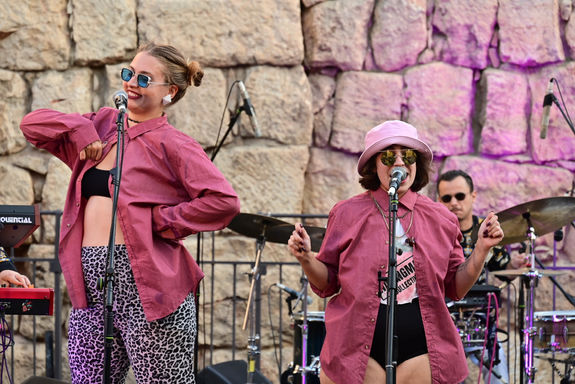
Israel Ministry of Foreign Affairs

イスラエルミュージック最新レポート・2021冬
イスラエル音楽の今を伝えるイスラエリー・ミュージック・ショーケースフェスティバル(IMSF)。2021年度は20数カ国から集まった約50人の音楽関係者たちの前で全41組の音楽アーティストが素晴らしい演奏を披露した。
ーサラーム海上(音楽評論家)
2021年 11月24日から28日の5日間、エルサレムとテルアビブにてIMSFが開催された。このフェスはイスラエル音楽を世界の音楽シーンに紹介するために2011年から毎年行われてきたが、昨年はコロナ禍により、初のオンライン開催となった。そして、今年はいまだ収束しないコロナ禍の隙間をぬって、現地開催された。過去にはロック&インディーズ、ジャズ&ワールドと、音楽ジャンルを2つのグループに分けて、それぞれ4日間ずつ、各約30組の音楽アーティストが出演していたが、今年は初の試みとしてジャンル分けせずにオールジャンルで合計5日間、全41組の音楽アーティストが出演した。
出演したのはEli Degibri、Omri Mor、Shalosh、J Lamotta すずめ、Garden City Movementなど、既に国際的に活躍し、日本公演まで行っているジャズやクラブ系アーティストから、現地で人気のロック~ポップ・スターのNiyet TaebやAgatまで多彩な顔ぶれ。そして、観客は20数カ国から集まった約50人の音楽プロフェッショナルたち、要はプロモーター、イベンター、ジャーナリスト、僕のようなDJたちだ。更に会場を温めてくれる地元の音楽ファンたちの存在も忘れてはならない。
メイン会場はエルサレム南部にある大型ライブハウス「Yellow Submarine」。そこに加えて、今年は映画館を改装したダンスシアター「Ha Parsa」、東西エルサレムの境界線上に造られた多目的文化施設「Feel Beit」、旧市街の重要な史跡である「ダビデの塔博物館」、テルアビブで最もクールな半野外ライブハウス&レストラン「Teder FM」など、現在のイスラエル文化を代表する様々な場所が用いられた。
期間中は毎日、午後から深夜3時までかけて演奏を聴き、移動し、お酒を飲み、アーティストたちや各国の音楽関係者たちと交流をはかるのだから、猛烈な忙しさとなり、体調管理こそが重要となる。時差ボケのまぶたをさすり、長時間立ちっぱなしで重い腰や棒のようになった足を引きずりながらも観る価値がある音楽演奏ばかりだからだ。
様々なルーツ、様々なスタイル。共通するのは、この国の音楽教育の高さとミュージシャンたちの演奏能力の高さ
僕にとって今年の目玉はモロッコとブラジルのルーツを持つ女性歌手Lala Tamar(ララ・タマル)。まだソロ活動を始めたばかりだが、向日葵のように輝く笑顔と、モロッコ~アラブ·アンダルシア音楽の素養に基づく確かな歌唱力、そしてポップでキャッチーな曲想も良い。僕だけではなく、その場にいた誰もが彼女に魅了され、とあるアメリカ人プロデューサーは「彼女はダイナマイトだ!」と絶賛していた。
5年以上かけて開発したという自作の改造楽器Whale guitar(鯨ギター)を静かに弾き語るシンガーソングライター、Ofer Mizrahi(オフェル・ミズラヒー)も素晴らしかった。十数本の共鳴弦が付けられたWhale guitarはまるでインド古典音楽の弦楽器サロードのような甘い響きで、しかも彼の曲づくりにはブラジルのボサノヴァや北東部音楽、フランスのシャンソン、更にアラブ音楽などからの影響も聞き取れた。まるで個人的な祈りのような音楽だった。
エレクトロニック、ヒップホップ、ファンク、ポップ、ロックの人気アーティストも多数出演した。その中にはイスラエルの音楽(ユダヤ音楽や中東音楽など)要素が希薄なアーティストも含まれていたが、それでもこの国の音楽教育の高さとミュージシャンたちの演奏能力の高さには常に圧倒された。
全てのアーティストをここでは紹介しきれないので、興味を持たれた方は、僕がナビゲーターを務めるラジオ番組「NHK-FM音楽遊覧飛行エキゾチッククルーズ」や「J-WAVE Oriental Music Show」をぜひお聴きいただきたい。
こうしてイスラエル音楽の今を堪能し尽くした最終日の28日、押し寄せる新型コロナウィルス・オミクロン株に対応するため、イスラエル政府は突如、外国人旅行者の入国を禁止した。もし開催が一週間後だったなら、IMSFはキャンセルとなっていたのだ。そして、僕たちは(一時的ながらも)最後の外国人旅行者になってしまった。連日の疲労を取るために訪れたテルアビブのビーチで、僕は海水に浮かびながら、そんなシュールな現実を思い知った。来年のIMSFはアフター・コロナの世界での開催となることを切に願っている。

サラーム海上 Salam Unagami
音楽評論家/DJ/中東料理研究家/朝日カルチャーセンター講師
中東やインドを定期的に旅し、現地の音楽と料理シーンをフィールドワークし続けている。10冊の著書、雑誌やWEBでの原稿執筆のほか、ラジオやクラ�ブのDJ、オープンカレッジや大学での講義、料理教室講師等、活動は多岐にわたる。選曲出演するJ-WAVE の中東音楽専門番組「Oriental Music Show」が2017年日本民間放送連盟賞ラジオエンターテインメント番組部門最優秀賞を受賞。コミュニケーション言語は英語、フランス語、ヒンディー語、日本語。群馬県高崎市出身、明治大学政経学部卒。













